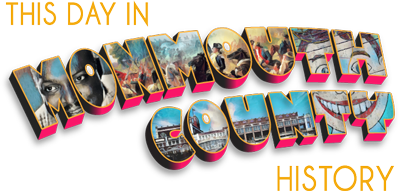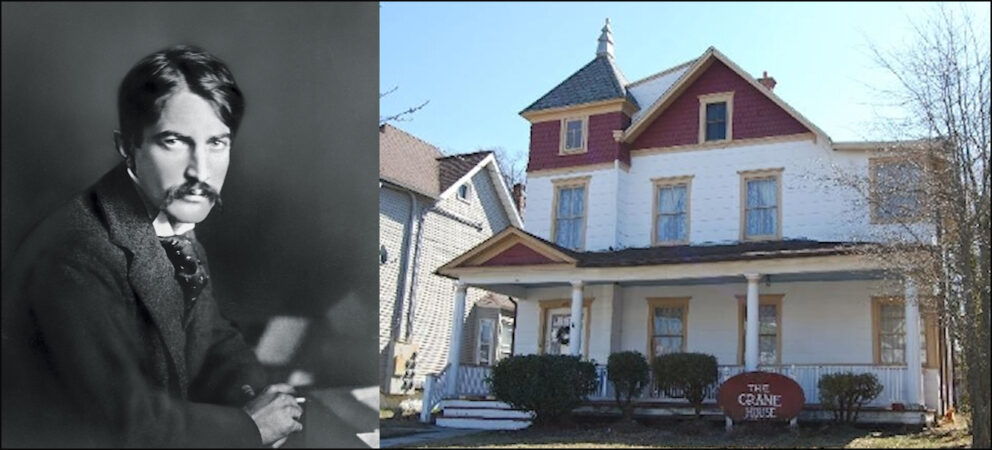On August 21, 1892, a story appeared in the Sunday edition of the New-York (sic) Tribune that launched the meteoric career of one writer, and ended the career of another - his brother.
Jonathan Townley Crane, Jr., known as “Townley,” the elder brother of Stephen Crane by 18 years, was described by one biographer as “all newspaperman.” Townley had “quickly advanced” at the Asbury Park-based Jersey shore office of the New York Tribune. He headed the Long Branch departments of both the Tribune and the Associated Press and served as the editor of the Asbury Park Shore Press, predecessor of the Asbury Park Press. Townley became known as “The Shore Fiend,” the ultimate tenacious newspaperman.
Townley helped his brother Stephen, an aspiring journalist, to get work covering events along the Jersey shore for the Tribune. His first stories appeared anonymously in 1890, then under his own name in the summer of 1891. “As Townley’s assistant, he spent his time writing up humdrum doings at Avon-by-the-Sea, taking note of lectures, classes, instructors, and various prominent visitors.” Over time, his depictions of the goings-on and personalities of the region became increasingly “satiric and daring.”
On August 17, 1892, Crane witnessed the American Day parade of the Junior Order of United American Mechanics marching through Asbury Park. Crane’s article contrasted the “sun-beaten honesty” of the marchers with the wealthy Asbury Park onlookers in their “summer gowns, lace parasols, tennis trousers, straw hats and indifferent smiles.” At least two Tribune editors approved the story and it appeared in the Sunday edition on August 21, 1892. People misread the story, however, thinking it an indictment of the common working man, and outrage was immediate, despite the fact that Crane had meant to lampoon the wealthy onlookers, and not the marchers. And most of the outrage did not come from locals.
Townley defended his brother, but the fallout affected nearly everyone involved in the story. The owner of the Tribune, Whitelaw Reid, was a candidate for vice president of the U.S. on the Republican ticket with Benjamin Harrison. Crane’s story became fodder for Reid’s opponents, and later it would be said that “the parade that made Stephen Crane famous” had cost the Republicans the presidential election.
The Tribune printed an apology to its readers, and severed ties with Stephen Crane, and ultimately with Townley Crane as well. Townley was dropped by the AP and the Asbury Park Press as well. Stephen found the whole matter amusing, but Townley was said to be “as glum as a king who had lost his crown.”
Stephen Crane would die just eight years later, but would know success and fame during his lifetime as author of bestselling novel “The Red Badge of Courage” (although after his death he would be largely forgotten for decades…). But Townley Crane’s life was ruined. He was said to never be the same again after losing his career and, died a broken man.
The Crane family house (see photo above), at 508 Fourth Avenue in Asbury Park, has been preserved as a museum and event space, and is open Sundays from noon – 2:00 p.m. Text of Stephen Crane’s August 21 column in The New-York Tribune:
ON THE NEW-JERSEY COAST.
GUESTS CONTINUE TO ARRIVE IN LARGE NUMBERS.
PARADES AND ENTERTAINMENTS−WELL-KNOWN
PEOPLE WHO ARE REGISTERED AT
THE VARIOUS HOTELS.
Asbury Park, N.J., Aug. 20 (Special).−The parade of the Junior Order of United American Mechanics here on Wednesday afternoon was a deeply impressive one to some persons. There were hundreds of the members of the order, and they wound through the streets to the music of enough brass bands to make furious discords. It was probably the most awkward, ungainly, uncut and uncarved procession that ever raised clouds of dust on sun-beaten streets. Nevertheless, the spectacle of an Asbury Park crowd confronting such an aggregation was an interesting sight to a few people.
Asbury Park creates nothing. It does not make; it merely amuses. There is a factory where nightshirts are manufactured, but it is some miles from town. This is a resort of wealth and leisure, of women and considerable wine. The throng along the line of march was composed of summer gowns, lace parasols, tennis trousers, straw hats and indifferent smiles. The procession was composed of men, bronzed, slope-shouldered, uncouth and begrimed with dust. Their clothes fitted them illy, for the most part, and they had no ideas of marching. They merely plodded along, not seeming quite to understand, stolid, unconcerned, and, in a certain sense, dignified−a pace and a bearing emblematic of their lives. They smiled occasionally and from time to time greeted friends in the crowd on the sidewalk. Such an assemblage of the spraddle-legged men of the middle class, whose hands were bent and shoulders stooped from delving and constructing, had never appeared to an Asbury Park summer crowd, and the latter was vaguely amused.
The bona fide Asbury Parker is a man to whom a dollar, when held close to his eyes, often shuts out any impression he may have had that other people possess rights. He is apt to consider that men and women, especially city men and women, were created to be mulcted by him. Hence the tan-colored, sunbeaten honesty in the faces of the members of the Junior Order of United American Mechanics is expected to have a very staggering effect upon them. The visitors are men who possessed principles.
A highly attractive feature of social entertainment at the Lake Avenue Hotel during the past week has been the informal piano recitals given by Miss Ella L. Flock, of Hackettstown, N.J., who is one of the guests of that house. Miss Flock won a gold medal for superiority in piano playing at the Centenary College Institute last spring by her fine performance of Beethoven’s “Sonata Pathetique.” She plays with singular power and grace of expression, and with the assured touch of a virtuoso.
Editor’s note: From here, Stephen Crane’s column continues for another ten column inches consisting of names of people visiting the various hotels and guest houses in the region. e.g., “Judge L.E. Griffith, of Troy, has arrived at the Brunswick with his handsome daughter.”
Sources:
Davis, Linda H. (1998). Badge of Courage. Houghton Mifflin Company, New York, N.Y., P. 49-51.
Berryman, John (1950, 1977.) Stephen Crane: A Critical Biography. First Cooper Square Press, New York, N.Y., P. 43-45.
https://www.facebook.com/The-Stephen-Crane-House-92768250949/


Leave a Reply